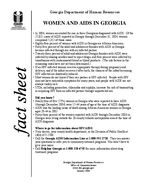fact sheet
Georgia Department of Human Resources
WOMEN AND AIDS IN GEORGIA
In 2004, women accounted for one in three Georgians diagnosed with AIDS. Of the 27,821 cases of AIDS reported in Georgia through December 31, 2004, women comprised 5,312 of those cases.
Eighty-four percent of women with AIDS in Georgia are African-American. Forty-five percent of the adult and adolescent females with AIDS in Georgia
became infected through sex with an infected partner. Twenty-three percent of adult and adolescent Georgia females with AIDS were
infected by sharing needles used to inject drugs, and four percent were infected by transfusions with contaminated blood or blood products. (The risk factors in the remaining cases have not yet been determined.) If an HIV-infected woman receives appropriate therapy during pregnancy and delivery, and if the infant receives it after birth, the chances of the infant becoming HIV infected are drastically reduced. Most women do not know if their sex partner is HIV-infected. People with HIV may not have noticeable symptoms for many years, and people with AIDS are not always visibly sick. STDs, including gonorrhea, chlamydia and syphilis, increase the risk of transmitting or acquiring HIV from an infected partner through unprotected sex.
Did you know? Nearly four of five (77%) women in Georgia who were reported to have AIDS
(through December 2004) were 15-44 years of age at the time of AIDS diagnosis. AIDS was the leading cause of death among African-American women in Georgia
ages 20-44 in 2002. Forty-three percent of the women reported with AIDS through December 2004 in
Georgia were living outside the 20-county Atlanta metropolitan area at the time of AIDS diagnosis.
Where to go for information about HIV/AIDS Your doctor, your county health department, or the Division of Public Health at
(404) 657-2700. Call the Georgia AIDS Information Line at 1-800-551-2728. They can answer
your questions or refer you to community outreach programs. You won't have to give your name. Call Helpline Georgia at 1-800-338-6745 for more information about drug treatment programs.
Georgia Department of Human Resources Office of Communications www.dhr.georgia.gov January 2006
